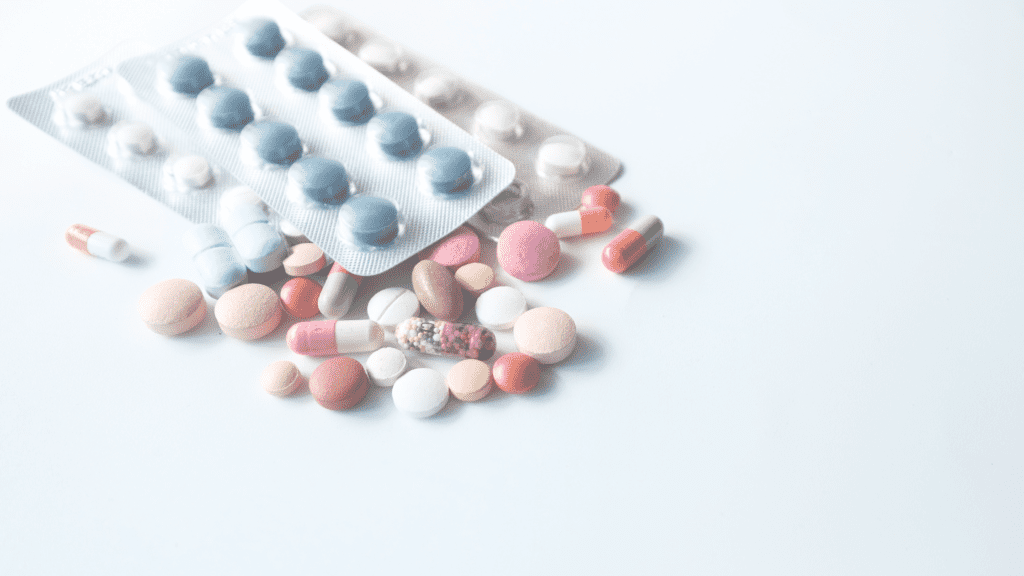When I was in high school, I took Accutane pills for my severe cystic acne. I knew there would be Accutane side effects to watch out for while taking the drug. Yet I didn’t think I’d still be dealing with Accutane long term side effects 13 years later!
Read on to learn what side effects I still suffer from, and how I manage them. If you are considering taking Accutane, read my experience before starting it.

What Is Accutane?
For a quick rundown on Accutane, let’s start with the basics. Accutane is a drug to treat severe acne breakouts. The generic name for Accutane is isotretinoin. In my treatment, I actually took isotretinoin pills. You could also say I suffered from isotretinoin side effects.
Accutane itself is actually discontinued and there are about 5 other brands of isotretinoin that are prescribed. Still, people generally refer to isotretinoin just as Accutane.
Isotretinoin is a form of retinoic acid (metabolite of Vitamin K).
When taken in the body, it works by
“…reducing sebaceous gland size by decreasing proliferation of basal sebocytes, in suppressing sebum production up to 90% by inhibiting sebaceous lipid synthesis.”
Science Direct – Isotretinoin Revisited: Pluripotent Effects on Human Sebaceous Gland Cells
Basically, it reduces the oil grands and oil production in the skin.
Accutane Side Effects
While studies say that Accutane is safe and it’s been used for about 40 years, it is a very serious drug. There are actually a lot of side effects of Accutane that can be experienced.
According to Mayo Clinic,
More Common Side Effects that require you to contact your doctor are:
- burning, redness, itching, or other signs of eye inflammation
- nosebleeds
- scaling, redness, burning, pain, or other signs of inflammation of the lips
- skin infection or rash
- and more
Rare Side Effects that you also need to contact your doctor for:
- Attempts at suicide or thoughts of suicide (usually stops after medicine is stopped)
- bleeding or inflammation of the gums
- blurred vision or other changes in vision
- headache (severe or continuing)
- mental depression
- pain, tenderness, or stiffness in the muscles (long-term treatment)
- rectal bleeding
- stomach pain (severe)
- yellow eyes or skin
- and more
These side effects are also more common, but typically go away after you take the medication:
- dryness of the eyes, mouth, or nose (may continue after treatment is stopped)
- itching or dryness of the skin
- increased sensitivity of the skin to sunlight
- peeling of the skin on palms of the hands or soles of the feet
- thinning of the hair (may continue after treatment is stopped)
- and more
Get the full list in this Mayo Clinic article. All side effects listed above are from the article.
Isotretinoin Side Effects in Females
Are there any side effects females need to watch out for when taking Accutane (isotretinoin)?
The biggest side effect for females concerns pregnancy. Taking this medication while pregnant can result in
- Severe Birth Defects
- Miscarriage
- Stillbirth
Please, please take care to avoid getting pregnant while taking this medication, or taking it while you are already pregnant.
Does Accutane Turn Your Bones Green?
I had never heard this before and I admit I laughed a bit. It sounds super crazy! I think that the notion of it turning your bones green stems from another acne medication – tetracycline. This drug stains bones yellow, and minocycline stains bones dark green.
I think that this happens more frequently in oral bones and is rarely documented as occuring elsewhere.
So no, Accutane shouldn’t turn your bones green.
My Accutane Background
As I mentioned above, I went on Accutane in high school. It was probably 13 or so years ago, and I cannot remember the specific brand of isotretinoin I took or the dosage. I do believe that I took it for 6 months.
Accutane is actually something that has been life-changing for me. I believed it helped me get the confidence I didn’t have with acne. As a young teen, I hadn’t realized the power of loving and accepting myself yet. Having clear skin, and being “normal” was all I wanted.
I am thankful though that it cleared up my skin and stopped the self-loathing.
Now that I am more invested in skincare and health, there are 5 alternatives I do wish I tried before taking the deep dive into Accutane which is a “last resort” drug.
Here is an article you can read if you would like to know what they are and try them out. It might help you on your journey before you start Accutane, if that’s something you are considering.
Now on to the long term Accutane side effects I still experience 13 years later.
My Accutane Long Term Side Effects 13 Years Later
I am grateful I didn’t suffer from any major side effects during the course of my treatment. While taking the medication I was constantly worried about the warnings of depression and suicide.
At the time of taking Accutane, I developed very dry skin. This is understandable because as mentioned above, it works to stop oil production. Since my skin was being dried out, my scalp was also affected. Dandruff was a big battle! I also experienced extremely chapped lips and nosebleeds. Last but not least, my digestion on Accutane became worse than it ever had been.
I mention these as they are the Accutane long term side effects I still (for the most part) experience daily.
Extremely Chapped Lips
(I’m starting off with this one to scare you.)
This is my NUMBER ONE COMPLAINT, and MOST HATED post Accutane long term side effect.
The extremely chapped lips that I developed while taking Accutange (it is actually a very common side effect) have never gone away.
For most, this side effect will stop after you stop taking Accutane. But it didn’t for me.
Here is a picture of my flaky, dry, tight and scabby lips. They bleed really easily as well.
My lips look old and lined due to the flakiness and me picking at them.

I have tried every lip balm and treatment under the sun. Yes, Aquaphor helped make my lips more comfortable when I took the medication, but I don’t want to have to use this for the rest of my life.
My lips are in such a bad state, and nothing seems to HEAL them. Currently, I am on the hunt for products that will help my lips that are not lip balms, as I have learned that those actually contain many ingredients that will dry out lips even more.
Now, I have dry flaky lips that just get covered with a balm or Aquaphor, but doesn’t actually cause the skin to heal. When the lip balms wear off, the dry terrible lips come right back.
Don’t even get me started on wearing any lipstick really – it all seems to just dry out the skin and highlight the chapped lips.
Dry Skin
Accutane works by decreasing the size of oil glands in the skin and suppressing oil production. Since taking the medication, my skin has been super dry. I definitely cannot go without using moisturizer on my face. If I don’t my face feels tight and uncomfortable.
In the winter, I usually always have to use a body lotion or my skin will be itchy, dry, and bleed/scab easily after scratching.
Dry Scalp
I believe my scalp was also affected, and became very dry. I have always struggled with having powdery dandruff. Typically, after letting my hair air dry after showering, the scalp becomes super itchy. It is almost impossible to not scratch it. When I do scratch it, the powdery dandruff shows up at my roots and becomes very noticeable.
Because of this, I don’t feel comfortable unless I shower the next day to wash out the powdery dandruff. This in turn creates a cycle where my scalp continues to be over-washed and dried out even more.
I have tried many dandruff shampoos, and different types of shampoos as well but nothing has helped. Recently, I found a scalp treatment that has really helped me get moisture back into my scalp and take away the itchiness. In doing so, I don’t create powdery dandruff and can go many days in between without shampooing.
Read More: Raw Sugar Pure Scalp Therapy: $7 Easy Fix For Oily Hair
Bad Digestion
My digestion has always been bad because of a terrible diet as a teen. As I have grown up and learned the importance of health, I eat better than I ever have. I eat real foods and less processed/sugar-laden/fast food. Still, I will have a hard time going to the bathroom regularly. Bloating and gas are common for me always. It is a huge inconvenience and something that doesn’t make me feel my best or healthiest.
Nosebleeds
Sometimes I find that my nosebleeds from a super dry nose can be triggered and then become hard to stop for a few days. After the “floodgates” have opened, the slightest bump even can start my nose bleeds up again. It is obviously worse in the winter with drier air but sometimes it can happen in the warmer months too.
I remember stuffing Aquaphor up in my nostrils while taking Accutane to get relief from the dryness. Sometimes I still have to do that now.
My Overall Isotretinoin Side Effects Long Term Review
Of course, this is my experience. Everyone’s body is different, so what I experienced might not happen to you. I just wasn’t aware that some things might stick around longer after taking Accutane.
I am not sure if these symptoms will go away. Them going away naturally, on their own seems very unlikely to me since it’s been so long. Supplementing with products to heal these side effects might have to be my reality forever. I just want to find cures that will do their best to heal everything at the root of the problem.
So far, not much has been able to do that.
My hope is that this article informs you of what might happen if you take Accutane. It was worth it to me to have clear skin, and I am grateful for that. I am also thankful that I haven’t suffered from worse side effects than others have.
These side effects don’t completely uproot my life, but are pretty annoying.
Please connect with me if you have any questions, or suggestions on things you might think will help!
Best, Mia
This content is for informational purposes only, and what has worked for me personally based on my own opinions. I am not a professional/medical doctor, and you should always consult your doctor or dermatologist on what will work best for you. The information presented here is not legitimate, official advice from a professional. If you choose to rely on any information from this blog, you do so at your own risk. Please refer to the “Blog Disclaimer” tab in the menu bar to read more information and the official disclaimer statement.


